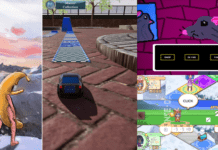You are not signed in.
Bukola Akingbade
Friday 25th February 2022
Share this article
Playable Futures is a collection of insights, interviews and articles from global games leaders sharing their visions of where the industry will go next. This article series has been brought to you by GamesIndustry.biz, UKIE, Sumo Group and Diva.
I grew up with games. It started with traditional games like ludo, draughts and Ayo, an indigenious yoruba game (also known as ‘mancala’ in other cultures). I’d spend hours watching my Uncle and cousins in heated gameplay.
As was customary in those days, girls were not allowed to participate or compete, but I did. I played table tennis, shot pool and competed in various sports. It wasn’t a giant leap therefore, to make the transition to video games. Although my first console was a Commodore 64, the game I loved to play the most was Gradius on the Nintendo.
Now, as a mother, I can proudly say that we have a playful home. This notion of ‘play’ extends beyond video games. Our ethos as parents revolves around play-based thinking. Exploring the link between games and education has always been at the forefront of my interactions, with children specifically.
Bukola Akingbade, Kucheza Gaming
Despite holding a first degree in architecture, I have spent the past two decades building a career in marketing with a particular focus on behavioural trends. I began to observe a trend within my own home. My children would constantly complain to me about how boring school was for them. Now, I’m pretty sure I articulated the very same sentiment when I was young, so I could definitely empathise! I also noticed that no such complaint emerged when they were engaged with games. So I started to study Africa’s games market.
The way people access games here in Nigeria and on the continent is definitely different from places like Europe and the US. Traditionally, developing economies as seen in parts of Africa are hindered by a severe lack of infrastructure, which directly hinders access to popular video gaming devices. Today, we see minimal growth in PC and console gaming across Africa. However, mobile is where the real growth lies.
The more we studied the market, the more we saw the potential for growth within the games industry, with mobile being the democratiser. 95% of all video games played in Africa are played on a mobile device. With a median age of 19.5 years, the fastest growing and most youthful continent, Africa can now contribute and compete due to access. This trend will continue to accelerate to 945 million people under the age of 24, by 2050.
A realisation led us to start thinking about how the games industry could meaningfully impact Africa’s youth. Games catch the attention of kids and teens in ways the more traditional teaching methods do not. With clever game design, the power of games to directly or inadvertently teach lessons is clear. Take Minecraft for example; even as a trained architect, I can clearly see the results of the knowledge gained as my kids now know more about building materials than I do! All I could see was potential.
As we deepened our research into the relationship between games and young people in Nigeria, we started thinking about the future, the problems we faced — and still face. Across the continent the rise of youth, increased unemployment and sometimes employability — that idea that even after completing school, young people might not have the right skills or experience to actually be ready for the workplace — led us down this path.
With such a huge opportunity available in the intersection of video games and education, we have to ask ‘what do kids need for their future?’ By taking a considered approach, we believe video games’ and the disparate opportunities within the industry, can help retain young people’s attention, while simultaneously utilising the tool to build a better future.
Video games are going to be a more important and credible part of education in Nigeria and the wider continent. And even globally
All this led to the founding of Kucheza Gaming. We are an Africa-focused video games industry startup that uses gaming as a gateway to digital excellence, where kids get the opportunity to develop skills in STEAM. We bring the world of video games to k12 education in Africa through game development initiatives like the Mobo Game Jam, a series of school e-sport leagues and a game-based computing curriculum in partnership with UKIE Education.
At Kucheza Gaming we utilise the love for video games to drive fun, learning, and skills development. Helping young people make active decisions about their careers and helping inspire them to choose and pursue STEAM related interests. This isn’t simply about teaching everyone to be game developers; our vision is grander. We want to teach kids big universal skills they can learn through a passion for games but apply everywhere, in a variety of jobs and roles.
According to Diane Tavenner, the co-founder and CEO of Summit Public Schools and author of ‘Prepared: What Kids Need for a Fulfilled Life’, kids need to learn big universal skills to be ready for the future of work. Skills like communication, problem solving, critical thinking, collaboration, self-direction, leadership, resilience, agency etcetera. Video games offer a new and immersive way to play, learn, reimagine, document and preserve history as well as help us experience the world around us.
Kucheza’s key project, ‘The Wild Kingdoms’ is a mobile adventure game based on Yoruba mythology, it is aimed at translating African folk stories into the educational and entertaining world of games, thereby introducing African stories to new generations and audiences.
We’re absolutely going to see more of this intersection between video games and education, because it harnesses creativity and curiosity in a fun way. This approach can unlock potential and universal skills in any child. That is so powerful. Video games are a tangible path to Africa’s GDP growth. Unlocking creativity can help share the many, many beautiful, different and fascinating cultures across the continent with the rest of the world.
Video games are going to be a more important and credible part of education in Nigeria and the wider continent. And even globally. Educational systems and infrastructure are not that fast moving — change takes time. I believe that the private sector and private public partnerships will push this opportunity. There’s an opportunity for shared success.
More people are starting to see what a difference games can make when they intersect with education. It’s about legacy. Kids are already creative and have passion and things they want to do. Bringing games into education and vice versa can facilitate impact at scale. This will impact art and activism and politics and culture too. Collaborations like the Minecraft Uncensored library project gives us a glimpse into what can be possible when we embrace a world of play.
And while we’re not here to primarily grow the Nigerian game industry, or the continent’s game industry, I do think that the intersection of video games and education will help lead us to a point where a game industry will contribute significantly to GDP here. The intersection of games and education is a starting point for all of that. What’s happening in the space today is shaping the future of a lot more than games, and the generation growing up with games as part of their education are going to do some amazing things in the world.
Bukola Akingbade is founder and CEO of Kucheza Gaming
Sign up for The Daily Update and get the best of GamesIndustry.biz in your inbox.
More stories
Valorant maker appoints former managing director of emerging markets, Alex Kraynov as new APAC managing director
By Jeffrey Rousseau
Update: Ubisoft details employee support and Digital Extremes donates $100,000 as EGDF calls for countries to fast-track residency and work permits for refugees
By James Batchelor
Related Jobs
Generalist Programmer, Fully Remote (UK Based) ?DOE
Datascope Recruitement
Cambridge
Senior UI/UX Designer – SYDNEY AUSTRALIA / REMOTE within 4hrs
Datascope Recruitement
Sydney
Senior Tech Artist – FULLY REMOTE- New IP!
Datascope Recruitement
Tulsa
Latest comments
There are no comments on this article yet. Why not be the first to post one?
Sign in to contribute
Need an account? Register now.
Latest articles from our team
James Batchelor
Editor-in-Chief
How the Rainbow Billy team swapped combat for conversations
Brendan Sinclair
Managing Editor
The ongoing erosion of exclusivity | This Week in Business
Rob Fahey
Contributing Editor
The costs of buggy game launches are mounting | Opinion
Christopher Dring
Head of Games B2B
Horizon: Forbidden West is the second biggest PS5 launch so far | UK Boxed Charts
Marie Dealessandri
Features Editor
Clone culture and its continuous impact on indie developers
Danielle Partis
News Editor
Elden Ring | Critical Consensus
Jeffrey Rousseau
Staff Writer
How much progress has the industry made on diversity, equity, and inclusion?
Upcoming Events
EGX London
22nd Sep 2022 – 25th Sep 2022
ExCeL, London, United Kingdom
Latest Comments
William D. Volk posted a comment in
Crowdfunding becomes the gold rush du jour | 10 Years Ago This Month
Rogier Voet posted a comment in
The UK games industry is struggling with Brexit
Ron Dippold posted a comment in
Horizon Forbidden West was delayed to avoid crunch











